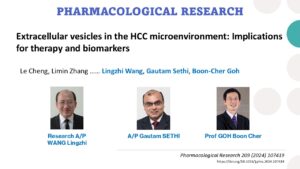
ABSTRACT
Hepatocellular carcinoma (HCC) stands as the sixth most prevalent cancer and the third leading cause of cancer mortality globally. Despite surgical resection being the preferred approach for early-stage HCC, most patients are diagnosed at intermediate to advanced stages, limiting treatment options to chemotherapy and immunotherapy, which often yield poor outcomes. Extracellular vesicles (EVs), minute lipid-bilayered particles released by diverse cells under various physiological and pathological conditions, are crucial for mediating communication between cells. Mounting evidence indicates that EVs sourced from different cells can profoundly influence the HCC tumor microenvironment (TME), thereby affecting the progression of HCC. Given their immunogenicity and liver-targeting properties, these EVs not only hold promise for HCC treatment but also provide avenues for advancing early diagnostic methods and assessing prognosis. This review not only describes the function of EVs within the HCC tumor microenvironment but also analyzes their therapeutic advantages and explores their significance in various therapeutic approaches for HCC, including chemotherapy, immunotherapy, combination therapy, and their role as innovative drug delivery carriers. Furthermore, it highlights the potential of EVs as biomarkers for the diagnosis and prognosis of HCC.
Full article:https://doi.org/10.1016/j.phrs.2024.107419
